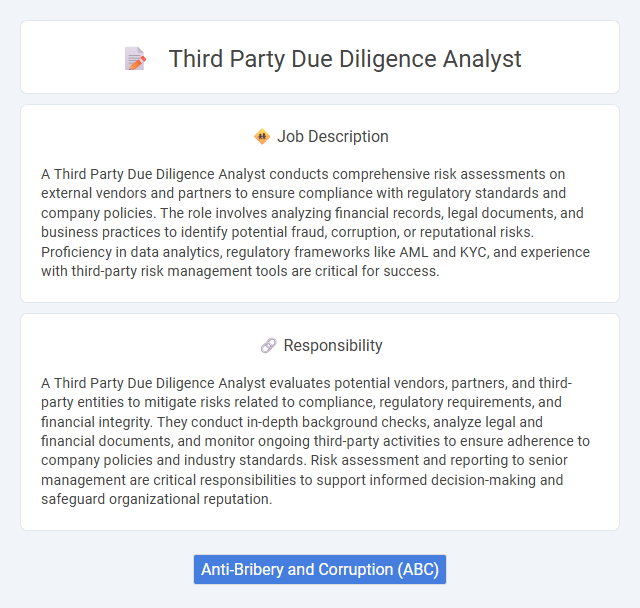
A Third Party Due Diligence Analyst conducts comprehensive risk assessments on external vendors and partners to ensure compliance with regulatory standards and company policies. The role involves analyzing financial records, legal documents, and business practices to identify potential fraud, corruption, or reputational risks. Proficiency in data analytics, regulatory frameworks like AML and KYC, and experience with third-party risk management tools are critical for success.
Individuals with strong analytical skills and attention to detail are likely to be well-suited for a Third Party Due Diligence Analyst role, as the job often requires assessing risks and compliance factors thoroughly. Candidates who are comfortable working in a regulatory environment and can handle complex data under pressure probably have a higher probability of success. Those with less interest or experience in investigative work and regulatory frameworks might find the role less aligned with their strengths.
Qualification
A Third Party Due Diligence Analyst requires strong analytical skills and experience in risk assessment, compliance, and regulatory frameworks such as AML, KYC, and GDPR. Proficiency in data analysis tools, attention to detail, and knowledge of industry-specific standards are essential qualifications. Candidates with certifications like CAMS or Certified Anti-Money Laundering Specialist and excellent communication skills are highly valued.
Responsibility
A Third Party Due Diligence Analyst evaluates potential vendors, partners, and third-party entities to mitigate risks related to compliance, regulatory requirements, and financial integrity. They conduct in-depth background checks, analyze legal and financial documents, and monitor ongoing third-party activities to ensure adherence to company policies and industry standards. Risk assessment and reporting to senior management are critical responsibilities to support informed decision-making and safeguard organizational reputation.
Benefit
A Third Party Due Diligence Analyst likely enhances risk management by thoroughly evaluating external vendors and partners to ensure compliance and mitigate potential liabilities. This role probably improves decision-making processes through detailed assessments and verification of third-party credentials. Employing such an analyst may lead to increased operational efficiency and safeguarding of the company's reputation.
Challenge
A Third Party Due Diligence Analyst likely faces the challenge of thoroughly evaluating complex and diverse external entities to mitigate risks effectively. They may encounter difficulties in verifying the accuracy of information from multiple sources while ensuring compliance with regulatory standards. Managing tight deadlines and maintaining up-to-date knowledge of evolving compliance requirements could also present ongoing obstacles.
Career Advancement
A Third Party Due Diligence Analyst enhances organizational risk management by evaluating vendor compliance, financial stability, and regulatory adherence, providing critical insights to safeguard business operations. Mastery of industry standards such as AML (Anti-Money Laundering) and KYC (Know Your Customer) protocols positions analysts for advancement into senior risk management or compliance roles. Continuous skill development in data analytics and regulatory frameworks accelerates career progression toward leadership positions within corporate governance and third-party risk oversight.
Key Terms
Anti-Bribery and Corruption (ABC)
A Third Party Due Diligence Analyst specializing in Anti-Bribery and Corruption (ABC) conducts thorough risk assessments on vendors, partners, and intermediaries to ensure compliance with global ABC regulations. This role involves analyzing financial records, geopolitical risk factors, and past compliance behavior to identify potential bribery, corruption, or sanction violations. Expertise in regulatory frameworks such as the Foreign Corrupt Practices Act (FCPA) and the UK Bribery Act is essential for mitigating legal and reputational risks in third-party relationships.
 kuljobs.com
kuljobs.com